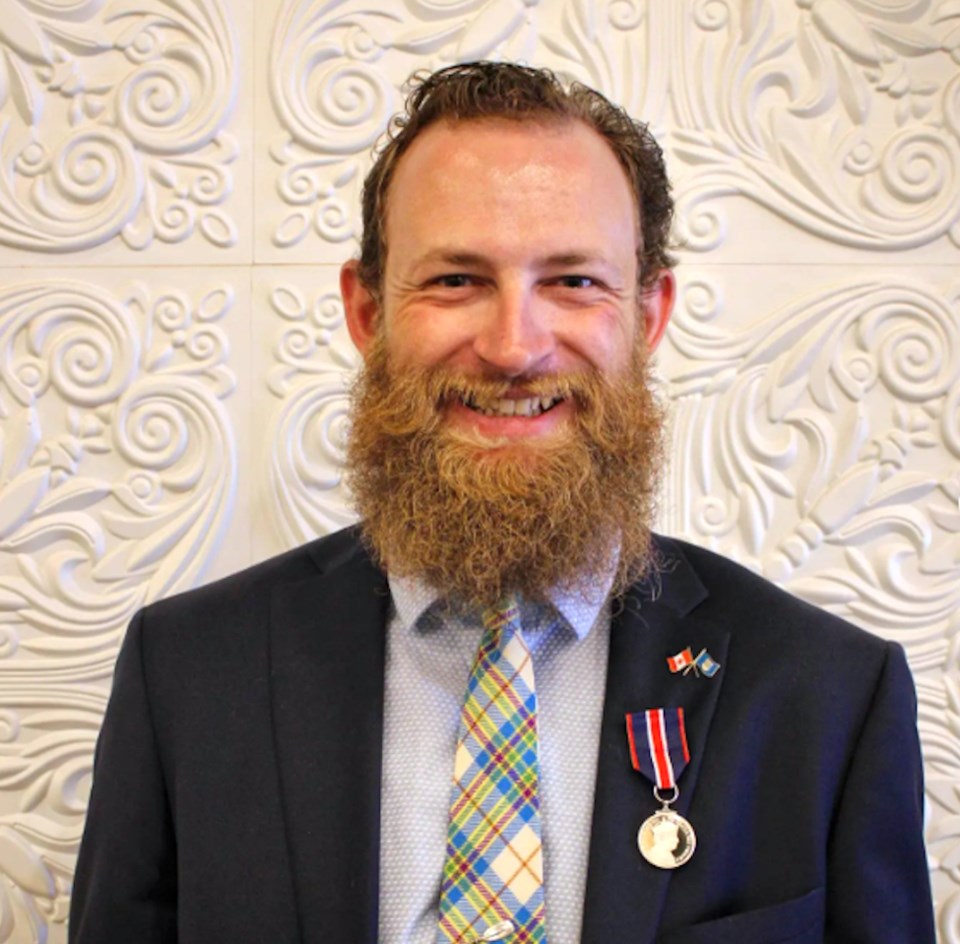WESTLOCK — Long-time Westlock County resident Kyle Schole is one of several unsung heroes being recognized for his work as an environmental and heritage preservation advocate in Alberta.
Schole was one of 20 Albertans awarded the King Charles III Coronation Medal by Alberta Senator Paula Simons earlier this summer.
The King Charles III Coronation Medal is being distributed to 30,000 individuals who have made a significant contribution to Canada or to a particular province, territory, region or community in, Canada, or attained an outstanding achievement abroad that brings credit to Canada.
The medal program is being administered by the office of the Governor General and is the first Canadian commemorative medal to mark a coronation.
Schole 31, was born and raised in Westlock County near Busby, attended R.F. Staples School and still considers Westlock home. He now resides in Edmonton and works as a municipal planner in Sturgeon County.
Schole was presented his medal in a ceremony in Edmonton on Aug. 6.
“It was really very humbling and surprising to be honest with you,” said Schole. “It was very kind and generous of Senator Simons to give me one of these.”
Schole was working as a planner for Smoky Lake County when he began his advocacy work for the North Saskatchewan River in 2019. That project was completed in the spring of 2024 and resulted in the North Saskatchewan River being designated as a Canadian Heritage River, after years of work and collaboration that involved raising awareness about its environmental and heritage significance.
“It’s wonderful to be recognized for a project that has been really long-term. It’s been ongoing for some time and it’s one that I’m very passionate about personally as well as professionally,” said Schole.
“Some people don’t often think of heritage and environment as holding hands, but I think they are and our environment is so important to our quality of life. We’ve inherited it from our ancestors and we’ll pass it onto our descendants.”
The Heritage River Program has been around since the 1980s and a portion of the river, located in Banff National Park, was previously designated as part of the program. This year, the remaining 718-km portion that flows from north of Rocky Mountain House through Devon, Edmonton, and Fort Saskatchewan, to the Saskatchewan border, was also given a heritage designation.
“This is only the second river outside of a national park in Alberta to be part of the program,” said Schole, noting the other river, the Clearwater River near Fort McMurray, was designated in the mid-2000s.
Senator Simons said it was a highlight of her career as a Senator to present the medals to such deserving recipients.
“What a gift and what a privilege to have the chance to honour Albertans like this, who I feel have really made a difference in their communities and in their professional fields,” said Simons, noting the impact of the work by Schole and the county.
“(Smoky Lake County) really wanted to help people see the river in a new way. It’s about protecting the river environmentally, it’s about celebrating the heritage and the history of the river, both for the First Nations and for the colonial settlers who came after,” said Simons. “But it’s also about eco-tourism and bringing some attention economically, to the value of the river to its communities,” she added.
“I really felt that this was an important way of honouring some extraordinary people who might otherwise not get that kind of honour,” said Simons, who recognized Albertans in the areas of agriculture, arts, immigration and refugee work, heritage preservation and LGBTQ2S+ rights.
Schole spoke about the river’s lasting legacy and what it means, as one of 40 rivers in Canada with the designation under the Canadian Heritage River System.
“There’s inter-generational knowledge, there’s inter-cultural knowledge. We connected with members of Indigenous communities and heard their stories as well,” said Schole. “So now it’s important that we continue to do this work and not just let this designation collect dust on a shelf, but also keep partnering, keep making advancements and bettering the river.”



